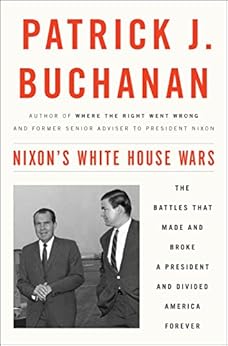


03/08/2018
Unless there is a late surge for Communist Party candidate Pavel Grudinin, who is running second with 7 percent, Vladimir Putin will be re-elected president of Russia for another six years on March 18.
Then we must decide whether to continue on course into a second Cold War, or engage Russia, as every president sought to do in Cold War I.
For our present conflict, Vladimir Putin is not alone at fault. His actions have often been reactions to America’s unilateral moves.
After the Soviet Union collapsed, we brought all of the Warsaw Pact members and three former republics of the USSR into our military alliance, NATO, to corral Russia. How friendly was that?
Putin responded with his military buildup in the Baltic.
George W. Bush abrogated the Anti-Ballistic Missile Treaty that Richard Nixon had negotiated, Putin responded with a buildup of the offensive missiles he put on display last week.
The U.S. helped to instigate the Maidan Square coup that dumped over the elected pro-Russian government in Ukraine.
To prevent the loss of his Sebastopol naval base on the Black Sea, Putin countered by annexing the Crimean Peninsula.
After peaceful protests in Syria were put down by Bashar Assad, we sent arms to Syrian rebels to overthrow the Damascus regime.
Seeing his last naval base in the Med, Tartus, imperiled, Putin came to Assad’s aid and helped him win the civil war.
The Boris Yeltsin years are over.
Russia is acting again as a great power. And she sees us as a nation that slapped away her hand, extended in friendship in the 1990s, and then humiliated her by planting NATO on her front porch.
Yet, what is also clear is that Putin hoped and believed that, with the election of Trump, Russia might be able to restore respectful if not friendly relations with the United States.
Clearly, Putin wanted that, as did Trump.
Yet, with the Beltway hysteria over hacking of the DNC and John Podesta emails, and the Russophobia raging in this capital, we appear to be paralyzed when it comes to engaging with Russia.
The U.S. political system, said Putin this week, "has been eating itself up." Is his depiction that wide of the mark?
What is the matter with us?
Three years after Nikita Khrushchev sent tanks into Budapest to drown the Hungarian revolution in blood, Eisenhower was hosting him on a 10-day visit to the USA.
Two years after the Berlin Wall went up, and eight months after Khrushchev installed missiles in Cuba, Kennedy reached out to the Soviet dictator in his widely praised American University speech.
Lyndon Johnson met with Russian President Alexei Kosygin in Glassboro, New Jersey, just weeks after we almost clashed over Moscow’s threat to intervene in the Arab-Israeli War of 1967.
Six months after Leonid Brezhnev sent tank armies to crush the Prague Spring in August 1968, an inaugurated Nixon was seeking detente.
In those years, no matter who was in the White House or Kremlin, the U.S. establishment favored engagement with Moscow. It was the right that was skeptical or hostile.
Again, what is the matter with this generation?
True, Vladimir Putin is an autocrat seeking a fourth term, like FDR.
But what Russian leader, save Yeltsin, has not been an autocrat? And Russians today enjoy freedoms of speech, assembly, religion, travel, politics, and the press that the generations before 1989 never knew.
China, not Russia, has the more repressive single-party Communist state.
Indeed, which of these U.S. allies shows greater tolerance than Putin’s Russia? The Philippines of Rodrigo Duterte, the Egypt of Gen. Abdel-Fattah el-Sissi, the Turkey of President Erdogan, or the Saudi Arabia of Prince Mohammad bin Salman?
Russia is nowhere near the strategic or global threat the Soviet Union presented. As Putin conceded this week, with the breakup of the USSR, his nation "lost 23.8 percent of its national territory, 48.5 percent of its population, 41 percent of its gross domestic product and 44.6 percent of its military capacity."
How would Civil War Unionists have reacted if the South had won independence and then, to secure the Confederacy against a new invasion, Dixie entered into an alliance with Great Britain, gave the Royal Navy bases in New Orleans and Charleston, and allowed battalions of British troops to deploy in Virginia?
Japan negotiates with Putin’s Russia over the southern Kuril Islands lost at the end of World War II. Bibi Netanyahu has met many times with Putin, though he is an ally of Assad, whom Bibi would like to see ousted, and has a naval and air base not far from Israel’s border.
We Americans have far more fish to fry with Russia than Bibi.
Strategic arms control. De-escalation in the Baltic, Ukraine and the Black Sea. Ending the war in Syria. North Korea. Space. Afghanistan. The Arctic. The war on terror.
Yet all we seem to hear from our elite is endless whining that Putin has not been sanctioned enough for desecrating "our democracy."
Get over it. 
COPYRIGHT 2018 CREATORS.COM
Patrick J. Buchanan needs no introduction to VDARE.com readers; his books State of Emergency: The Third World Invasion and Conquest of America, and Suicide of a Superpower: Will America Survive to 2025? are available from Amazon.com. Patrick J. Buchanan is the author of “The Greatest Comeback: How Richard Nixon Rose From Defeat to Create the New Majority.
His latest book, published May 9, is “Nixon’s White House Wars: The Battles That Made and Broke a President and Divided America Forever.”
See Peter Brimelow’s review: “Wheel And Fight” — Pat Buchanan’s Nixon Book Provides Road Map For Trump.